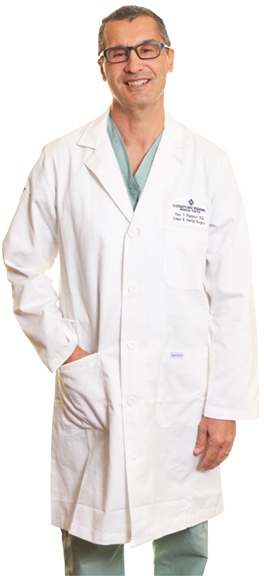Colorectal Surgeon, Chesapeake Surgical Specialists, Chesapeake Regional Medical Group
 About a third of all colon surgeries in the United States are now done minimally invasively, while two-thirds of patients still must undergo open procedures.
About a third of all colon surgeries in the United States are now done minimally invasively, while two-thirds of patients still must undergo open procedures.
Dr. Ray Ramirez has dedicated much of his career to flipping those figures. By training surgeons, residents and medical students nationwide in less invasive methods that he has developed, Ramirez hopes the majority of future patients will find themselves on the less grueling side of the equation.
“Put simply, my goal is to save more people from big operations,” he says. “Often, we can get the same results with much less pain and recovery time, shorter hospital stays and a significantly reduced risk of permanent complications.”
Ramirez, a second-generation colorectal surgeon, specializes in complicated cases of the small intestine, colon and rectum. A nationally-recognized expert on procedures such as hand-assisted colon resection and sphincter-sparing surgery, he often is among the first physicians to test advanced technology in the operating room. His peers, along with local and national publications, have named him a top doctor on numerous occasions.
Laparoscopic procedures on the colon can be difficult to perform because – unlike with an operation such as gallbladder removal or hysterectomy – surgeons often need to enter multiple regions of the abdomen on a single case, Ramirez notes. To help, he has developed a system that standardizes the locations of incision and trocar sites. “This takes a lot of variability out of the equation, so it is more reproducible,” he explains. “It is simpler to teach, and to learn.”
For patients with low rectal cancers, sphincter-saving minimally invasive surgery aims to preserve muscle function in the anal canal and opening, thus avoiding a permanent colostomy bag. “Once these patients are fully recovered, they almost always can go to the bathroom normally,” Ramirez says. “Obviously, that is quite important to their quality of life.”
Ramirez also has embraced laparoscopic-assisted colonoscopy for removal of complex colon polyps, which lowers the risk of colon perforation and dangerous bleeding. By placing a laparoscope into the abdomen and a standard colonoscope into the colon at the same time, he can visualize the intestine from both the outside and inside. “If we do any damage while removing polyps, we can fix the problem immediately,” he says.
Ramirez had big shoes to fill as a doctor: his father and role model, Dr. Renato Ramirez, was a prominent local colorectal surgeon. Ramirez was born when his dad, now retired, was completing a fellowship at the Mayo Clinic; the family moved to Hampton Roads shortly afterward. The son knew he wanted to be a surgeon, too, and the challenges and rewards of his father’s specialty appealed to him.
“You’re doing a lot of complex intra-abdominal surgeries, hopefully curing people of colon cancer,” he says. “And just in general, people who have anorectal problems – issues such as hemorrhoids and abscesses – are very miserable. When you can make them better, they are very, very grateful. I get a lot of hugs at work.”
After graduating from the University of Virginia, Ramirez completed his medical degree and general surgery residency at Eastern Virginia Medical School. He followed that with a colon and rectal surgery fellowship at Alton Ochsner Medical Foundation in New Orleans. He then had a chance to practice with his father for several years in Chesapeake: “It was great because we taught each other different skills. My dad didn’t do minimally invasive surgeries, for one, which forced me to get very proficient at them.”
Ultimately, Ramirez became so proficient that Ethicon, a subsidiary of Johnson & Johnson that develops surgical systems and instruments, asked him to become a teaching consultant. He now gives two-day courses on minimally invasive techniques to general and colorectal surgeons across the country, including lectures, videos and observation in the operating room. Ramirez also works with residents and students at Portsmouth Naval Hospital and EVMS. “The more people that are trained, the more cases we can hopefully get done this way in the future,” he says.
Beyond technology, Ramirez has discovered a good bedside manner is critical when socially embarrassing problems are involved. He also has gained insights from being on the opposite side of the doctor-patient relationship, as his mother-in-law died of rectal cancer.
“I try hard to make my patients feel comfortable – to put myself in their chair and treat them how I’d want to be treated,” he says. “I don’t use medical jargon. I want them to understand what’s happening to them and how I can help.” He uses that same plain talk in the free community seminars he conducts to educate the general public on colorectal conditions and cancers.
Outside of medicine, Ramirez describes himself as “an easy-going family guy.” A father of five – including a son who plays professional baseball with the Oakland Athletics organization – he and his wife, Vicky, usually rise at 4 a.m. to work out in their home gym. He’s an expert there, too: a former competitive bodybuilder, he won a state lightweight championship in 1998. He also met Vicky in a gym.
Meanwhile, the family’s medical tradition may continue. Ramirez’s oldest son, Ray Jr., is a second-year student at EVMS and already has been in the operating room with his father.
“He is definitely drawn to surgery, and he could be our third-generation colorectal surgeon,” Ramirez says. “He’s seen how much I love what I do. I have the greatest job in the world.”

